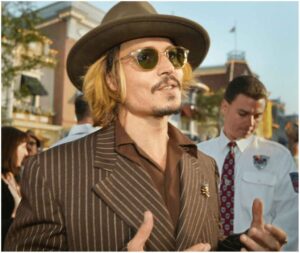From the dark and mysterious depths of a world that can only be described as Tim Burton-esque, Johnny Depp seemed destined to be an outsider. Though his early film career featured more conventional leading-man roles, Depp soon embraced his eccentricities, building a reputation that placed him firmly in the enigmatic realm. His unique characters and willingness to lean into his oddities have become defining traits of his acting legacy.
As a result of his prolific film venture, Depp boasts an impressive list of credentials, having worked with coveted names like Helena Bonham Carter, Vincent Price, Anne Hathaway, Marlon Brando, Kate Winslet, Christian Bale, and many more. Over in the music realm, his roster is no less immense, with Depp crossing paths with the likes of Jeff Beck, Iggy Pop, Alice Cooper, Marilyn Manson, and countless others.

Despite his acting achievements, Depp’s heart has always been in the music world, and it was the career he intended to pursue before achieving his first acting recognition at the suggestion of Nicolas Cage. Depp knew he had few options at the time with little prospects and increased pressure to make rent on time, so he gave it a try and unintentionally sparked a decades-long career in cinema.
More recently, however, Depp has stepped back from the spotlight, partly due to the fallout from his prolonged legal battles with his ex-wife Amber Heard, but mainly because he has been influenced by a lifelong sense of calling—a persistent urge that appears in various aspects of his life, urging him to explore different paths, but only when the circumstances allow.
When the Hollywood Vampires first started gaining traction, some weren’t sure of his abilities. Many criticised his approach to guitar playing, right down to the way he held the instrument, claiming that his talents are best placed back where they rightfully belong—in cinema. However, Depp’s connections and dedication to consistently improving have earned him a place among the stars in a musical realm that beckons endless study.
Alongside Cooper and Joe Perry, Depp is also well-acquainted with navigating the darker side of life. The Hollywood Vampires, for instance, emerged from an initiation marked by severe alcoholism. Many of their songs explore dancing with the devil, not only in recognising mortality but also in the sense of being forever alone after their many friends died of alcohol consumption.
It may sound bleak—and it is—but Depp also regards the sinister workings of the devil in a more commercial sense, acknowledging the old adage that music spawns from the man himself. This might not be a typical line of thinking, but for Depp, the excellence of the notion signifies music that exists beyond the capabilities of any human being—except for one.
In Depp’s view, the only person who holds the torch is Tom Waits. “The devil doesn’t have the best tunes. Tom Waits does,” he explained. “It’s almost impossible to single out a particular recording of his. Over the years, Waits’ continued quality of output has never faltered. His high-water marks are countless. This is merely one among many. For moon lovers and junkyard dogs everywhere.”
Beyond the various reasons Depp might find himself eternally endeared to Waits, the most obvious one seems to be an understanding of both mindset and creativity. Waits, like Depp, seems to be only concerned with world-class talent and music that serves a purpose. Of course, alongside that notion is Waits’ rebellious, non-conformist attitude, which no doubt hooked itself into Depp’s consciousness as a fellow pariah.





